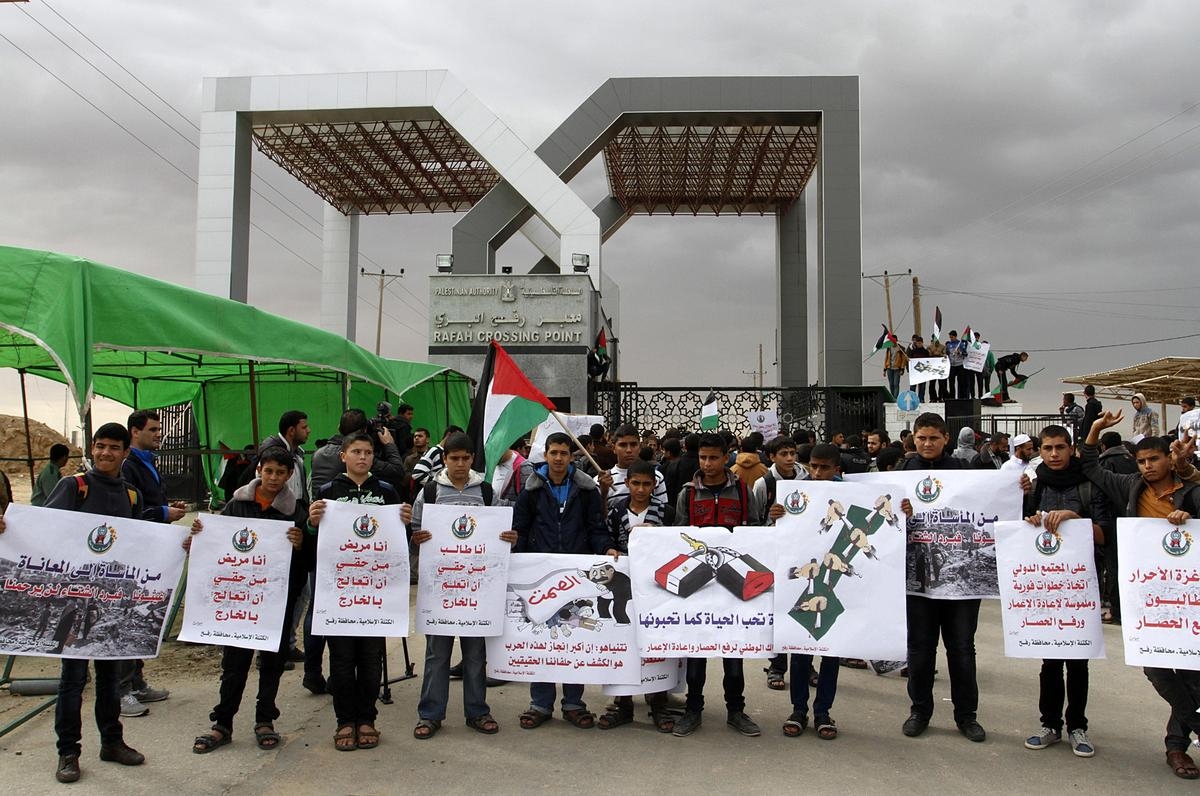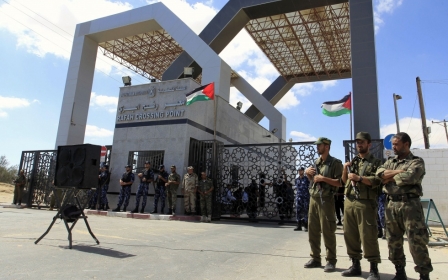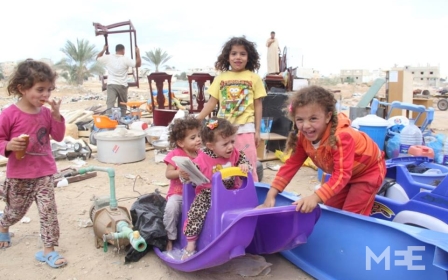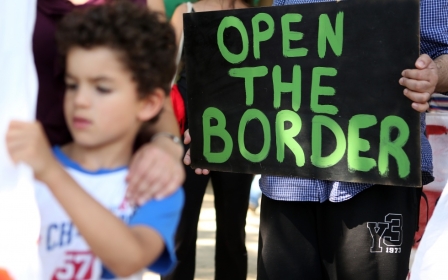And life goes on in Rafah

GAZA: Outside the Bank of Palestine in Rafah, a man in casual house clothes holds tight to the cash machine: if the news comes that the salaries of PA employees have, at last, been deposited, Hesham will be the first in line. Others sit on the dusty street, leaning against the wall of the old bank, refusing to move or to lose their place in the queue. The dust they sit in comes from the explosions just a few hundred meters away as Egyptian troops destroy the homes of their own people to create a buffer zone between Gaza and Egypt. “That cash machine will not fly away, Hesham,” jokes a young man on a donkey cart. Hesham just smiles and stands fast.
The bank is just a few hundred metres from the Gazan side of the Rafah border crossing into Egypt. The crossing has been closed for much of the time since July 2013, reopening only for medical emergencies, or for brief periods for foreign passport holders and pilgrims. Most Palestinians who want to cross the border – business people, students, families with relatives in Egypt – are stuck in limbo for weeks and months on end. Adding to their anxiety, around 50,000 Palestinians in Gaza – all those who work in the public sector and so are on Gaza’s de facto authority payrolls - have not received their salaries for months. The local economy has been hit hard.
A man outside the bank displays pairs of new shoes to those waiting in line; if they get paid, he hopes that he will find some customers to buy his unsold stock, so that he can go home with some money to feed his family. Winter is around the corner, and these people will need sturdy shoes, so the shoe-salesman busies himself wiping dust off the new shoes, buffing them up to look their best as he calls out the prices over the noise of taxis, cars, tuk-tuks, motorbikes, and donkey carts. But the salaries are not deposited, and the shoes remain unsold.
I am trying to find my way through the crowd, observing this human struggle to survive against tough odds in Gaza. As a journalist, I like this area; everyone wants to speak, to share their story and a cup of coffee and a smoke. Everyone – from the sheikh on his way to the mosque to the teenager who longs to spread his young wings and fulfill his ambitions across the border – is keen to vent their frustrations about Israel, or Hamas, or complain about Fatah and the Egyptian government turning its back on Palestine. The teenager sits with his back against the wall waiting, he says, for someone to announce something new, or just tell some jokes, or talk about something light and interesting – anything, he says, to help him escape the daily problems and obstacles, the daily reality of being blockaded in Gaza.
I first walked this street when I was 8 years old, and now I am 30. I remember seeing Uncle Abu Raed building the bank – I was a young boy, curious to know what the building would be. “This is going to be the first bank in Rafah,” Abu Raed said. “A bank. What’s that for?” I asked. “Well, you come here with your money to save it and use it for things you need or want, when you get older,” he replied.
I am standing exactly where I stood when I was 8 years old. Ashraf, the bank advisor is trying to organise the scores of people waiting outside, urging them to be patient. A young man is begging Ashraf for a loan of 100 shekels, to be repaid once his salary arrives. “I can’t do that anymore,” Ashraf says – but the man insists, explaining that he can’t buy a gas cylinder for cooking unless he pays up-front. The bank staff tells him a loan is impossible. Another man comes to ask if he can call his family because his phone battery has died while he is waiting.
Outside the bank is the local mill producing wheat flour, and the miller is queuing at the bank too, with his cousin, the carpenter. I last saw the miller when I was a boy; he still has the same red beard, but he looks much older than I remember. His hands are covered in flour still, and his machines are still coated with white flour dust from his hard work, producing wheat for the neighbourhood. The donkey outside can’t be the same one, but the smells of the street never change – wheat, and brewing coffee. Much is familiar, but much is changed too: the beautiful young women, relatives of the wheat man, who used to hang out behind the shops are gone, their homes demolished now, or reduced to huge potholes or tunnel openings in the ground. There is a smell of destruction.
Further down the road, the dust increases near the animal market, where sheep, cows, camels and goats are brought by their owners to be sold. Car horns get louder – but not as loud as the explosions nearby. But as I get closer to the Rafah border, it gets quieter and quieter. It is lunch break for troops – now there is only the noise of a bulldozer and the heavy gusts of wind that churn up the sand in a whirlwind. Faiz Abu-Taha sits against a wall facing his home, eating zucchini with tomato-sauce, bread and green chili; a kettle of tea bubbles beside him. “Come and eat with me” he says, as I approach. He has a mini-market which he opened to serve those who used to work in the tunnels, which were Gaza’s lifeline – because of the Israeli blockade, most things – from basic goods to luxury or life-saving items – used to come through the tunnels. The tunnel workers would come to the mini-market, sweating from working inside the tunnels, and buy everything they could afford. It was a busy, busy time for Abu-Taha. While we talk, Mahmoud Qeshta walks by - the 32-year-old used to hire more than 40 workers to dig the supply tunnel. But not anymore - that work has come to an end.
Mahmoud used to bring gravel and cement into Gaza, a business that provided him and his family with decent earnings. But now all his Egyptian counterparts are in trouble and all the tunnels he worked have been shut or destroyed. “Not even one cigarette, moves through my tunnel now,” he tells me.
Mahmoud explains that the system worked by bribing an Egyptian officer to smuggle things in from the Egyptian side of Rafah. Mahmoud would make $40,000 a day from smuggling tunnels at the height of Israel’s siege on Gaza, of which $11,000 went to his workers digging and working the tunnels and $10,000 to Gaza de facto authorities, as taxes, and $10,000 for his Egyptian partner and finally $9,000 for himself.
He wishes that he had had someone to tell him to save the money – one week he would buy a brand new Mercedes, the next week he would swap it for a new Toyota. Then he got married, and spent a lot of money on endless parties, fireworks and piles of food, as if the good-life would never end.
Now, Mahmoud is in need of just one cigarette.
One of Mahmoud’s former workers joins us. He comes to vent his frustrations, saying the owner of the apartment he rents is asking for a large payment up front, but he has no job, no salary, and so no option but to give up the apartment.
Leaving the men at the mini-market, I meet Jaber, a very skinny man in his early thirties, wearing the skinniest pants I have ever seen. He whistles while searching for his father amidst the ruins of the destroyed homes – he is collecting iron bars from the ruins, as he walks around the rubble with his hammer.
Walking further down the road in this new buffer zone between Egyptian and Palestinian Gaza, I see women, children and elderly people. Umm Sana is tired and bored. She has been standing and watching for the Rafah border gate to open all day long so she can go to Al-Sharkia in Egypt– but she can’t leave either, as the gate behind her is also closed. She has a daughter who is pregnant and due to give birth any day now, and she wants to be there to meet her first grandchild. She is anxious, hopping from one tired foot to the other. A young woman in red jeans informs me that the man she loves is in Qatar, and she wants to get there – but she and her brother came to visit relatives in Gaza and got stuck there, indefinitely. Everyone is rolling their eyes in frustration.
The waiting continues, people wanting something to happen after more than four weeks of closure at the border crossing. While the border had been open, to a degree, after the war this summer allowing a limited number of certain categories of people through, after a bombing in Sinai which killed 31 soldiers around four weeks ago, the border has been totally closed. Umm Sana nevertheless waits patiently, hopeful that she will soon cross and be with her daughter and new grandchild. The young lady, in love, is hopeful too – at least here at the border she can breathe, she says, and see the other side, and focus on leaving Gaza to start her new life.
New MEE newsletter: Jerusalem Dispatch
Sign up to get the latest insights and analysis on Israel-Palestine, alongside Turkey Unpacked and other MEE newsletters
Middle East Eye delivers independent and unrivalled coverage and analysis of the Middle East, North Africa and beyond. To learn more about republishing this content and the associated fees, please fill out this form. More about MEE can be found here.




